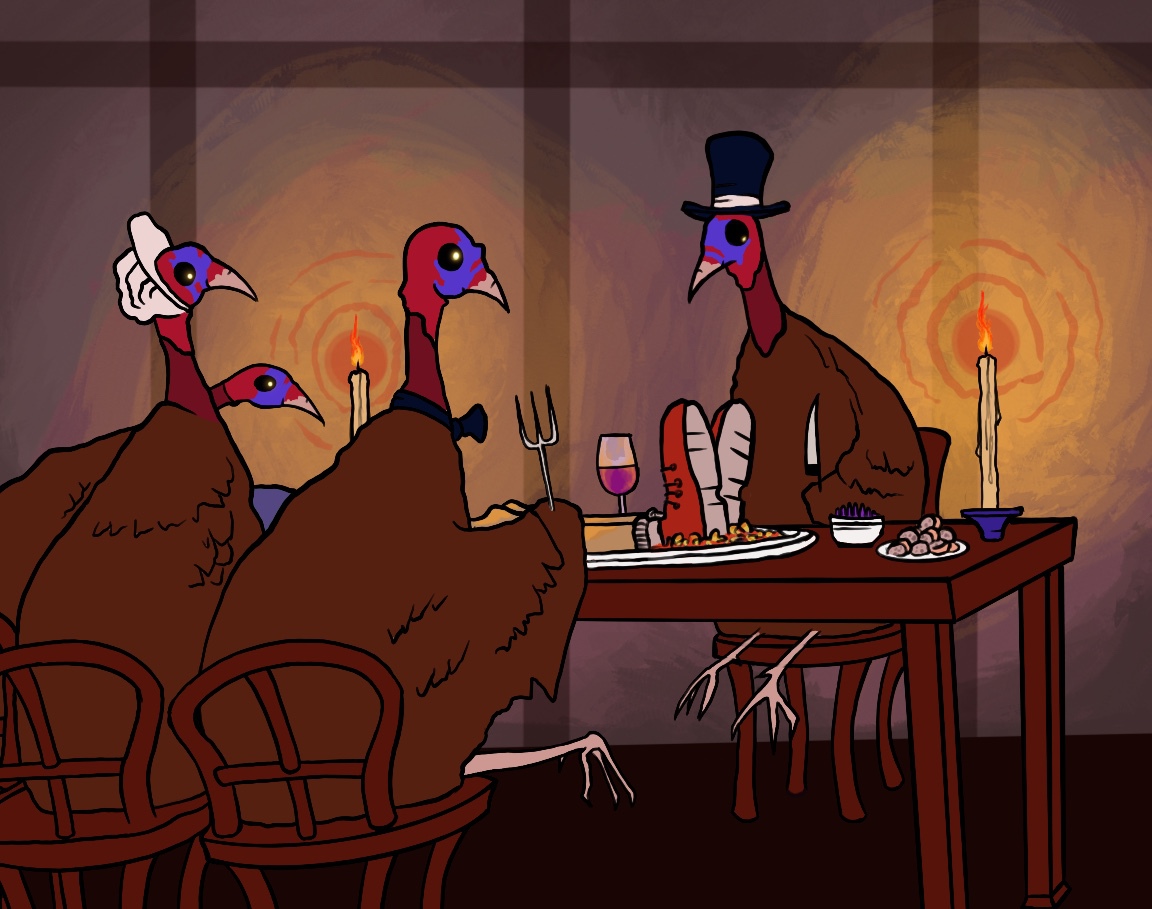
If you went to elementary school in the United States, you have undoubtedly heard the conventional myth of the first Thanksgiving. The story typically goes something like this: When the Pilgrims, the first permanent white settlers of what is now the U.S., arrived in today’s Massachusetts, they had to learn to survive in the wild. The Wampanoag tribe, who had been watching the Pilgrims for months, revealed themselves to the Pilgrims as winter approached, teaching the newcomers their ways of agriculture so that the Pilgrims would survive. The Pilgrims’ harvest ended up being so bountiful that they held a feast to thank the Wampanoag for their generosity.
Nearly every word of this story is false. It creates a narrative in which the American continent was willingly handed over to European settlers, and should no longer be taught as a national founding myth. However, it has almost no connection to the current holiday of Thanksgiving. The rush to create controversy around what ultimately started as a celebration of harvest, family and national unity clouds the pursuit of truth surrounding actual dark moments in American history.
If you have been in the U.S. for the past year and a half, you may have heard an alternate story of the first Thanksgiving: In 1637, the colonial governor of Massachusetts, John Winthrop, declared a “day of thanksgiving” in the colony after colonial soldiers massacred hundreds of Pequot men, women and children. This story is every bit as false as the traditional one. While the Wampanoag did dine with the Pilgrims, and hundreds of Pequot really were slaughtered in 1637, there is little connection between either event and the modern holiday of Thanksgiving.
As a school named after a pair of colonizers, Indigenous issues are especially fraught here at Lewis & Clark, as evidenced by the recent graffiti incident on Indigenous Peoples’ Day. Students have called into question some planned festivities surrounding Thanksgiving at LC, due to the holiday’s allegedly bloody history. But Thanksgiving does not stem from a celebration of killing Indigenous people, and should not be in the crossfires of a culture war.
America’s much-needed racial reckoning following the death of George Floyd saw authors, universities and media outlets make an effort to upend conventional narratives about our history. It should not be controversial to suggest that centuries of genocide, enslavement and oppression have been swept under the rug in order to portray European settlers as a benevolent force. However, in the scramble to rewrite American history, a different sort of myth has taken hold.
Many Americans feel so misled by traditional historiography that they become prone to believing that there must be a bloody history behind every American tradition. This is true in many cases, but the story of John Winthrop and the Pequot massacre, which spread virally across social media last November, is not the origin of Thanksgiving. In 1600s America, a “day of thanksgiving” was a general term for a holiday, with days of thanksgiving declared several times a year by colonial governors. Besides, the Pequot massacre occurred in May, making it an unlikely origin story for a November celebration.
The real roots of Thanksgiving, according to National Geographic, have little to do with either the Pilgrims or the Pequot. Many early colonists in North America held ceremonial dinners in autumn before the settling of New England. In Canada, for instance, Thanksgiving is celebrated in October, commemorating the 1579 feast of explorer Martin Frobisher, and Spanish and French settlers held similar feasts in the New World even earlier. Prayer meals to celebrate the harvest were commonplace in Renaissance-era Europe, and farming communities in what became the eastern United States carried on the tradition.
Moreover, Thanksgiving did not become an official holiday in the U.S. until the Civil War. Inspired by harvest festivals in New England, Abraham Lincoln created the federal holiday of Thanksgiving in 1863, with the intent of bringing America together after massive national upheaval. Before then, the holiday was rarely celebrated outside of New England. The story of the Pilgrims and the Wampanoag was only linked to Thanksgiving in the late 19th century, according to the Smithsonian, as part of a renewed interest in establishing a shared national history.
While usually thought of as an all-American tradition, Thanksgiving is in fact one of the most universal holidays America celebrates. Having originated as a harvest celebration, Thanksgiving is not all that different from the Chinese Mid-Autumn Festival, the Jewish Sukkot, the Slavic Dozynki and the Japanese Tsukimi, all of which are autumn festivals celebrated with feasts and family reunions. America’s Thanksgiving may have originated as a European Christian ritual, but a vast majority of cultures have similar harvest festivals, and this year when you eat turkey with your family, you can be thankful that you are not celebrating Indigenous genocide.
Today, America is more bitterly divided than at any other point since the Civil War, and Lincoln’s vision of a national holiday for friends and family to meet and reflect rings ever truer. Thanksgiving must not become a casualty of our culture wars.
Subscribe to the Mossy Log Newsletter
Stay up to date with the goings-on at Lewis & Clark! Get the top stories or your favorite section delivered to your inbox whenever we release a new issue.

Leave a Reply